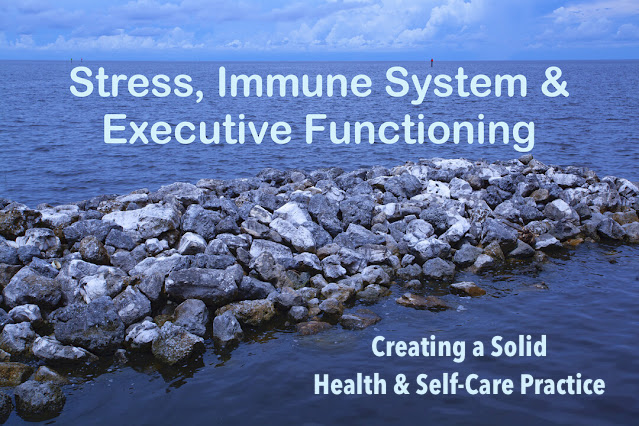Like stars are to the sky, so are the children to our world.
They deserve to shine.
-Chinonye J. Chidolue
The developing brain is one of the busiest factories on the planet. While newborns spend most of their day sleeping, their brain is in active mode. It's a construction site on par with no other, as synaptic connections are occurring at exponential rates. Each brain cell (neuron) has anywhere between a few to hundreds of thousands of synaptic connections, and these connections can be with itself, neighboring neurons, or neurons in other regions of the brain. SYNAPSES MATTER!
Newborns develop brain connections through their everyday experiences, such as interacting with caregivers and taking notice of their environments. Engagement with babies is about having fun and following their lead. This creates the bond between baby and caregiver. Babies crave this connection, interaction and stimulation. This leads us directly into the brain and the developing executive functions. THE BRAIN; THE COMMAND CENTER
There is a lot of talk circulating nowadays about executive functioning, especially as it relates to academic performance, attention span, concentration, and emotional and behavioral regulation. Parents, educators and mental health professionals are focusing quite a bit of their attention on these crucial life skills, with the appreciation of why and how they matter.
Typically these conversations center around school age children because that's when we notice their progression, especially when comparing them to those of similar aged-peers. However, these functions and their development start from the very beginning of the human experience; well before the young one is enrolled in school.
Brain development passes through a series of stages beginning with neurogenesis and progressing to neural migration, maturation, synaptogenesis, pruning, and myelin formation. Within the first few months of life, attention is the criterion best measured as a predictor for later development, while in the second half of the first year, problem solving skills can be observed as predictive of later executive function development.
This article will focus on the natural process of development, specifically to executive functioning, and how it's cultivated and grown through caregiver interactions and experiences.
WHAT IS EXECUTIVE FUNCTIONING (EF)?
The executive functions (EF) are higher-order cognitive and self-regulatory processes that form the foundation for goal-directed behaviors. Linked to the prefrontal cortex, they are continuously growing throughout childhood with a full expression of their development by approximately age 25; give or take a few years. However, this development becomes moderately stable in individual differences by around age 4, which will help predict academic and school readiness. Relative weaknesses at this age can be predictive of future attentional and/or learning disorders (among others). Children are not born with intact executive functioning and self-regulatory skills but instead with the potential to develop them.
At birth, the average baby's brain is about one quarter the size of the average adult brain. Within the first year, it doubles in size, and by age 5, it is nearly fully grown. Different parts of the brain are responsible for different abilities such as language, movement and emotional processing.
Brain development builds on itself and connections eventually link with one another, creating a rich and sophisticated tapestry capable of complex and coordinated movement, speaking and thinking. Keeping in mind that development is a process and not a race, attempts to speed its progression will result in a frustrated child and parent. When the conditions are favorable, development will unfold in a timely fashion that is unique to that particular child. However, when conditions are unfavorable, we may potentially see a significant hindrance to the child's development. These would be environments lacking proper nutrition and/or emotional and cognitive enrichment. Children need their basic physical and safety needs met before they can fully grow their executive functions.
The good news about the development of executive functions is that as a child enhances one function, others strengthen. For example, a child whose attention span increases through gaining strategies in play will, in turn, be a more skilled problem solver, since effective problem solving requires attentional skills.
A child whose problem solving skills increase will, in turn, be able to explore more options regarding behavioral and emotional self-regulation. So, by starting with a specific goal of expanding span of attention, there should expectedly be a correlative growth in adjacent executive processes. Now back to the beginning —>
To the developing brain, everything is a novel experience. Curiosity is built into the baby as a drive to understand how the world functions. With their eyes, newborns follow faces, sounds and interesting objects. Cuevas & Bell (2016) conducted a groundbreaking study whose purpose was to determine whether attention-style, as defined by short lookers (SL) and long lookers (LL), held any predictive value with the emergence of EF. An SL processes information more efficiently and rapidly than those described as LL (who are delayed in their ability to disengage and shift visual attention). This information has the potential to provide targeted early intervention(s).
I think, at a child's birth, if a mother could ask a fairy godmother to endow it with the most useful gift, that gift would be curiosity.
-Eleanor Roosevelt
The visual world of young infants can be best described as unstable and fragmented. Limited at birth, newborns have relatively poor visual acuity. They prefer high-contrast stimuli, such as black and white patterns.
As their visual field improves, they start to develop enhanced depth perception, color vision, and the ability to track moving objects. The relationship between the infant's visual field and later development of EF lies in the foundational role of early sensory experiences in shaping brain development. Visual stimulation and experiences contribute to and enhance the wiring of neural circuits, including those involved in EF. Infants are discovering and constructing their visual world and, again, synapses are forming at exponential rates and speed.
Emotions start off as a physiological system receiving input from the senses. Then, through interpersonal experience, they drive a child's interest in the world and create an internal mental life.
- Stanley Greenspan
While EF continues to develop throughout childhood and adolescence, here's a general overview of how it progresses from newborn to kindergartener:
NEWBORN - TODDLER (0 - 2 years)
It is during these years that foundational skills related to EF begin to develop. These skills include the basic regulation of attention, impulse control, and working memory. Attention is honed by focusing on objects and individuals (faces and voices) of interest.
Problem solving abilities start to emerge, such as figuring out how to reach for or manipulate a nearby object or toy. Rudimentary self-regulation skills, such as soothing themselves when upset, also start here, and this can become the foundation for later emotional and behavioral regulation.
Worthy of repetition, progression will occur at the child's pace and should never be rushed. The responsibility of caregivers is to provide the love, nurturance and stimulation needed for development. The child's brain will take over from here!
EARLY CHILDHOOD (2 - 5 years)
Executive functioning skills become more evident during these years and the child will spend an inordinate amount of time refining and honing these skills. This is a critical period for EF development in that the child will now develop awareness of these skills.
Following simple instructions, transitioning between activities, and basic planning and goal-setting become more apparent as attention, working memory and organizational skills improve. Warmth, patience and constructive feedback from caregivers and teachers allow for the feeling of emotional safety and will go a long way in creating a secure, stable and fun environment for the child to learn and the brain to fully develop.
In addition to the quality of the care the child receives, which is predominately the relationship with caregivers, two other crucial components to brain development include the freedom to explore and play, and the freedom to explore and interact with nature.
THE IMPORTANCE OF PLAY
When children play, they learn. They express. They grow. Play activates their developing brains' neural connections. New synapses and new patterns form. From shaking, banging and tossing objects to constructing, creating, and drawing, you can see the child's brain developing. From there, we get make-believe and imaginative play, listening or talking on a toy phone, and simple board games, reflecting the young brain's progression to more sophisticated thinking and processing. Typically, toddlers and preschoolers enjoy the company of playmates. They learn social skills from one another, as well as cognitive and language skills. I cannot emphasize the importance of play in children's development. It is how they learn and, more importantly, it's FUN!
The outside world is highly stimulating to the developing brain. It promotes focus, curiosity, creativity, exploration, behavioral regulation and critical thinking; significant components of EF. And if those benefits were not enough, there are more —> increased time spent outdoors is also linked to enhanced motor skills and vision development. Rather than screen time, promote nature time!
The World Health Organization (WHO), in accordance with the robust research conducted by Patricia Kohl, one of the globe's leading brain scientists, recommends no screen time for babies under 24 months of age, and only one hour of screen time per day for children between the ages of 2 and 4.
MORE SCREEN TIME
LESS ATTENTION SPAN
MORE NATURE TIME
BETTER ATTENTION SPAN
In conclusion, the development of the young child's brain is a sophisticated and complex dance comprising genes and experience (nature and nurture). Both serve to shape and enhance the emerging and developing brain. Understanding the coordination of the rhythm of genetic and experiential factors is helpful in helping children grow and thrive into their fullest potential.
I leave you with an excerpt from psychiatrist, Daniel J. Siegel from The Developing Mind:
"Although it is important to be aware of the significant and very real contributions of genetic and constitutional factors to the outcome of development , it is equally crucial that we examine what in fact is known about how experience shapes development.
Such a balanced view enables us as parents, for example, to have a sense of responsibility for the experiences we provide without the unnecessary burden of guilt generated by the belief that our actions are solely responsible for the outcome of our children's development."
- Daniel J. Siegel
THE DEVELOPING MIND
REFERENCES
Cuevas K, Bell MA. Infant attention and early childhood executive function. Child Dev. 2014 Mar-Apr;85(2):397-404. doi: 10.1111/cdev.12126. Epub 2013 May 24. PMID: 23711103; PMCID: PMC3766399.
https://www.unicef.org/parenting/child-development/babies-screen-time
Greenspan, S. I., MD (2010). The Learning Tree. Merlloyd Lawrence.
Siegel, Daniel J.The Developing Mind : toward a Neurobiology of Interpersonal Experience. New York :Guilford Press, 1999.
https://www.who.int/news/item/24-04-2019-to-grow-up-healthy-children-need-to-sit-less-and-play-more
The information presented in this blog is intended for general knowledge and is not a substitute for medical advice or treatment. If you are concerned about your child's development, it is advised to seek guidance from a licensed professional experienced in child development.
Let's connect:
FACEBOOK: Marie Therese Rogers
Atlantic Behavioral Health Professionals
Life in Focus
LINKEDIN: Marie T. Rogers, Ph.D.
INSTAGRAM: Mariethereserogers
YOU ARE ALSO INVITED TO LISTEN TO THE LIFE IN FOCUS PODCAST ON APPLE AND OTHER STREAMING DEVICES.
AMAZON BookBaby




















Very interesting article & very well written!
ReplyDeleteThank you!
Delete